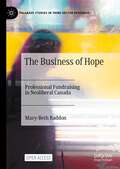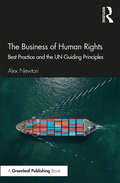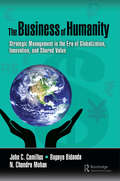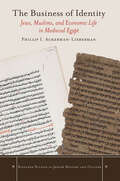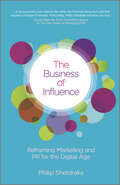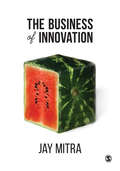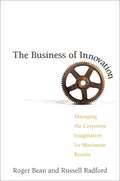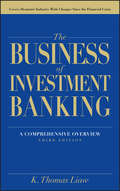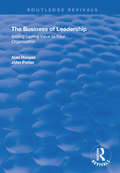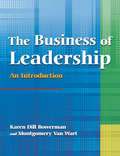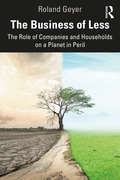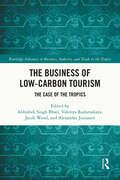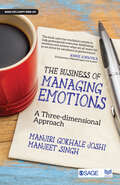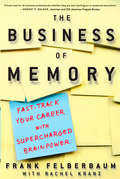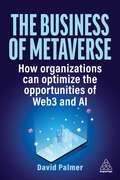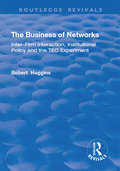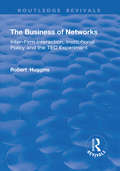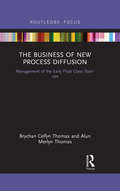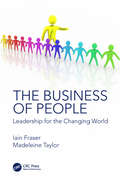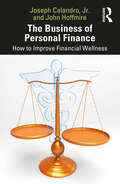- Table View
- List View
The Business of Hope: Professional Fundraising in Neoliberal Canada (Palgrave Studies in Third Sector Research)
by Mary-Beth RaddonThis open access book contributes to research on the ascendance of neoliberalism in Canada through the vantage point of professional fundraising in the 1990s and 2000s. Fifty high-ranking fundraisers from across Canada were interviewed through 2008 and 2009 about changes they had witnessed since starting their careers. Fundraising as an occupation was burgeoning in this period in response to the devolution of state responsibility across the major domains of nonprofit activity: education, health care, social services, the arts, recreation, overseas humanitarian activities, and environmental protection. Welfare state retrenchment left the nonprofit and voluntary sector competing for private sources of funding with the help of these newly hired expert staff. As fundraisers worked to instill a culture of philanthropy, while targeting the ultra-rich and advocating for tax-favourable treatment of major gifts, they became both products and promoters of the neoliberal political and cultural reconstruction of Canadian society.This is an open access book.
The Business of Human Rights: Best Practice and the UN Guiding Principles
by Alex NewtonThe spotlight of global scrutiny has shone particularly brightly on corporations’ adverse impacts on human rights in recent years. Corporations make up more than two-thirds of the world’s top economies today, and so rightly they are being called to account for their impacts on society and the communities in which they operate. The Business of Human Rights demystifies the relevance of human rights for business, explaining how the corporate responsibility to respect human rights under the UN Guiding Principles can be implemented in practice. It provides a straightforward, practical guide that can be easily read and interpreted by managers to help businesses navigate this complex area of legislation and "soft" law to fulfil their responsibilities. It explains the potential legal, financial and reputational implications for corporations and the steps they need to take to address them. The book tracks some of the major global developments in business and human rights, including the emergence of foreign, transnational, and international law and the proliferation of multi-stakeholder initiatives on business and human rights. Case studies from a range of sectors and industries – such as extractives, apparel, fast-moving consumer goods, electronics, and banking and finance – illustrate the enormous risks and opportunities human rights pose for business in practice. The Business of Human Rights will equip corporate executives, sustainability practitioners, academics, students, and anyone interested in business’s impacts on society with the essential information and tools they need to quickly come up to speed with the rapidly evolving area of business and human rights.
The Business of Humanity: Strategic Management in the Era of Globalization, Innovation, and Shared Value
by John Camillus Bopaya Bidanda N. Chandra MohanCompanies across the world, for a variety of reasons, are committing to incorporating social responsibility into their business models and finding that their profits are growing and their long-term sustainability is enhanced—building "humanity" into their business models as the driver of economic, environmental, and social sustainability. This fascinating development is a widely observable global phenomenon. The "Business of Humanity®" (BoH) Proposition is the synthesis of counter-intuitive but simple and powerful ideas about how companies can add value in today’s globalized and fast-changing world. The task of BoH Strategies is to overcome three critical challenges characterizing today’s business environment, namely disruptive technologies, conflicted stakeholders, and unknowable futures. BoH Strategies are designed to convert these challenges into opportunities for enhanced sustainability on all three dimensions—economic, environmental and social. Written by leading experts with decades of experience, this book: Provides a hands-on understanding of how to implement this powerful and rewarding approach to simultaneously add economic value and enhance social benefit Includes the experiences and approaches of highly regarded business executives and successful organizations Responds to the critical challenges created by three environmental mega forces – the inevitability of globalization, the imperative of innovation, and the importance of shared value. This book is based on lessons drawn from the real world and provides a compelling rationale for the power of the BoH Proposition. The pragmatic framework and process offered enable companies to develop and confidently implement value-adding strategies based on the BoH Proposition.
The Business of Identity: Jews, Muslims, and Economic Life in Medieval Egypt
by Phillip I. Ackerman-LiebermanThe Cairo Geniza is the largest and richest store of documentary evidence for the medieval Islamic world. This book seeks to revolutionize the way scholars use that treasure trove. Phillip I. Ackerman-Lieberman draws on legal documents from the Geniza to reconceive of life in the medieval Islamic marketplace. In place of the shared practices broadly understood by scholars to have transcended confessional boundaries, he reveals how Jewish merchants in Egypt employed distinctive trading practices. Highly influenced by Jewish law, these commercial practices served to manifest their Jewish identity in the medieval Islamic context. In light of this distinctiveness, Ackerman-Lieberman proposes an alternative model for using the Geniza documents as a tool for understanding daily life in the medieval Islamic world as a whole.
The Business of Influence
by Philip SheldrakeMedia has most definitely evolved, as have the ways in which we contemplate, design, communicate and execute strategy. And rather than technological evolution, we're plainly in the midst of a technological revolution.We have no choice then but to reframe marketing and PR in the context of 21st Century technology, 21st Century media and disintermediation, and 21st Century articulation of and appreciation for business strategy."Today, every organization is in the influence business. We influence customers to buy from us, employees to work for us, and the media to write about us. Gone are the days when you could be your own island. Now, to be successful, you need to live within the influence ecosystem and that requires a change of mindset. Fortunately, Philip Sheldrake will show you how."David Meerman Scott, bestselling author of The New Rules of Marketing & PR and the new hit Real-Time Marketing & PR
The Business of Innovation
by Jay MitraMoving beyond the narrow confines of a “how to” of Innovation management, The Business of Innovation sets out to track, trace and provide testimonies of innovation practice in small to large-scale organisations from countries around world. Through a combination of contemporary economic and social theory, and an array of practical examples from a wide range of sectors and industries, Jay Mitra offers critical insight into how global innovation works, where it works and most importantly, who makes it work, with an emphasis on innovative women. Suitable for postgraduate, doctoral and MBA students on business management and innovation courses and practitioners looking for a critical insight into the business of innovation.
The Business of Innovation
by Jay MitraMoving beyond the narrow confines of a “how to” of Innovation management, The Business of Innovation sets out to track, trace and provide testimonies of innovation practice in small to large-scale organisations from countries around world. Through a combination of contemporary economic and social theory, and an array of practical examples from a wide range of sectors and industries, Jay Mitra offers critical insight into how global innovation works, where it works and most importantly, who makes it work, with an emphasis on innovative women. Suitable for postgraduate, doctoral and MBA students on business management and innovation courses and practitioners looking for a critical insight into the business of innovation.
The Business of Innovation: Managing the Corporate Imagination for Maximum Results
by Roger Bean Russell RadfordThis is a guide to building innovative, creativity-rich organizations through astute and skillful management. Whatever the end goal, this book provides a systematic process for managing focused, usable innovation - without the micro-managing that can stifle creativity. With examples from McDonald's, Toyota, Palm (Pilot), 3M, Sony, Singapore Airlines and others, this model helps managers and executives: nurture an environment of innovation; support market-focused innovation through effective policies; gather expert feedback to properly evaluate innovations; develop and launch innovations successfully; and project future trends and developments.
The Business of Investment Banking
by K. Thomas LiawA comprehensive overview of investment banking for professionals and studentsThe investment banking industry has changed dramatically since the 2008 financial crisis. Three of the top five investment banks in the United States have disappeared, while Goldman Sachs and Morgan Stanley have converted to commercial banking charters. This Third Edition of The Business of Investment Banking explains the changes and discusses new opportunities for students and professionals seeking to advance their careers in this intensely competitive field.The recent financial regulation overhaul, including the Dodd-Frank legislation, is changing what investment banks do and how they do it, while the Volcker rule has shaken up trading desks everywhere.This new edition updates investment banking industry shifts in practices, trends, regulations, and statisticsIncludes new chapters on investment banking in BRIC countries, as Brazil, Russia, India, and China now account for a quarter of the global economyExplains the shift in the listing of securities away from New York to various financial centers around the world, and how major exchanges compete for the same businessThis new edition, reflecting the current state of the investment banking industry, arrives in time to better serve professionals wanting to advance their careers and students just beginning theirs.
The Business of Leadership: Adding Lasting Value to Your Organization (Routledge Revivals)
by John Potter Alan HooperFirst published in 1997, this volume special feature is its combination of practical and psychological behavioural aspects of leadership, presented in an easy readable style, which is designed for practising managers and for business schools. It proposes a new concept of ‘the learning leader’ and considers: How effective leadership adds real value to organizations The Skills of foresight and vision The impact of leadership on individuals and teams Leadership competencies A blueprint for the Future – Continuous Leadership Development The authors combine academic knowledge with practical experience. Alan Hooper was a senior military officer with the Royal Marines and is now Director of the Centre for Leadership Studies at Exeter University, which runs the only MA/Postgraduate Diploma in Europe. John Potter is a behavioural scientist operating as an independent management consultant.
The Business of Leadership: An Introduction
by Montgomery Van Wart Karen Dill BowermanSpecifically tailored to business students, this undergraduate textbook features a "how-to" approach and is filled with with current, lively examples and well-crafted learning tools. It takes readers from the kind of leradership they can exhibit in supervisory roles to the visionary leadership they must exhibit in management and executive roles.
The Business of Less: The Role of Companies and Households on a Planet in Peril
by Roland GeyerThe Business of Less rewrites the book on business and the environment. For the last thirty years, corporate sustainability was synonymous with the pursuit of ‘eco-efficiency’ and ‘win-win’ opportunities. The notion of ‘eco-efficiency’ gives us the illusion that we can achieve environmental sustainability without having to question the pursuit of never-ending economic growth. The ‘win-win’ paradigm is meant to assure us that companies can be protectors of the environment whilst also being profit maximizers. It is abundantly clear that the state of the natural environment has further degraded instead of improved. This book introduces a new paradigm designed to finally reconcile business and the environment. It is called ‘net green’, which means that in these times of ecological overshoot businesses need to reduce total environmental impact and not just improve the eco-efficiency of their products. The book also introduces and explains the four pollution prevention principles ‘again’, ‘different’, ‘less’, and ‘labor, not materials’. Together, ‘net green’ and the four pollution prevention principles provide a road map, for businesses and for every household, to a world in which human prosperity and a healthy environment are no longer at odds. The Business of Less is full of anecdotes and examples. This brings its material to life and makes the book not only very accessible, but also hugely applicable for everyone who is worried about the fate of our planet and is looking for answers.
The Business of Low-Carbon Tourism: The Case of the Tropics (Routledge Advances in Business, Industry and Trade in the Tropics)
by Alexander Josiassen Jacob Wood Abhishek Singh Bhati Valeriya RadomskayaThe millions of tourists who visit tropical nations annually underscore the region's significance in global tourism. However, these nations receive little scholarly attention compared to major countries. This book fills that gap, presenting a unique, in-depth exploration of the pressing transformations and shared sustainability challenges faced by nations and territories in the Tropics, providing valuable insights and solutions for low-carbon tourism development, and offering a novel attempt to progress the responsible tourism agenda.The book contributes to the emerging field of low carbon tourism. It concentrates on tourism-intensive tropical countries, exploring nation-specific and regional measures that could encourage low-carbon operations within the tourism sector. It focuses on distinct populations, host communities and service providers in the Tropics, distinguishing it from most texts on sustainability and low-carbon tourism that either focus on Western perspectives or strive for universal applicability. The chapters place the discussion within a contemporary context and introduce the challenges this era holds, including the role of marketing, policies and regulations, innovation, social norms and values in promoting low-carbon transition in tourism. Topics covered in this book include, but are not limited to, low-impact visitor behavior and low-carbon planning; voluntary, nudged, or compulsory participation in emission reduction initiatives; infrastructural, social, and psychological barriers to change; greenwashing and responsible marketing; ethnocentrism, and the politics of low-carbon tourism.Targeted primarily at academics and professionals in tourism, business, environmental management, policy studies, and public administration, this practical and insightful book is essential reading for anyone interested in low-carbon tourism development and the challenges that lie ahead.
The Business of Managing Emotions: A Three-Dimensional Approach
by Manjeet Singh Manjiri Gokhale JoshiWe work to create value in terms of sustenance or satisfaction. During this journey of creating value, we feel. Regardless of whether we are allowed to demonstrate it in public or whether we admit it to ourselves or not, whatever occurs at the workplace generates emotional moods. The expression of these emotions at work greatly depends on the social and cultural norms of various countries, regions, industries and the personal preference of people themselves. But the truth is, these emotions exist! The Navrasas comprise four negative emotional moods (rasas) that could hold back work performance, four positive ones that could spur productivity and a ninth one, which is the aim of this journey—the ability to sift the personal from the professional. The Business of Managing Emotions: A Three-Dimensional Approach offers practical solutions to leverage emotions at work through a three-dimensional emotional management (3-DEM) framework—an amalgamation of the performing arts, the medical science and the evolving social science of management.
The Business of Massage Therapy
by Mba Jessica Abegg Lmt MsibThis is the premiere guide to managing a successful massage career and running a successful holistic business. Written by veteran massage therapist and holistic business coach Jessica Abegg (LMT, MBA, MSIB), this visual, hands-on book contains all the tools readers need. It focuses on both practical concerns (such as finance and legal organization), and intangible elements of success (reflection, balance, and self-care). It also includes vital information on marketing and the Internet: knowledge often absent in the high-touch, low-tech world of massage. Throughout, it reflects the growing recognition that it is urgently important to help practitioners manage businesses and careers more successfully, as reflected in the inclusion of Business Practices in the new Massage Therapy Body of Knowledge.
The Business of Memory: How to Maximize Your Brain Power and Fast Track Your Career
by Frank FelberbaumThe first memory program specifically geared to business success--from the expert whose corporate seminars have boosted the careers of tens of thousands of employees and executives.At no point in history has the ability to synthesize and manage vast amounts of information been so crucial to business success. Yet research shows that within 3 hours to 3 days of learning something new, we'll forget 85 percent of what we've learned. Now, offering the same memory system he has used in his sought-after seminars and workshops, memory expert Frank Felberbaum shows you how to turn all that around. Instead of forgetting 85 percent of the people, facts, and ideas you are exposed to, you'll remember 85 percent--and you'll keep on remembering them as long as they are useful to you.Through a fun, easy-to-follow, four-step program that utilizes memory games, skills tests, and enjoyable interactive exercises, The Business of Memory will:o Improve your ability to retain, process, and retrieve information quickly and accuratelyo Teach you to harness your powers of observation, concentration, visualization, and associationo Inspire you with new excitement and confidence about your own mental abilitiesWith this simple program that requires only 10 minutes a day, you can vastly expand the amazing untapped powers of your mind--and set your career on the fast track.
The Business of Metaverse: How Organizations Can Optimize the Opportunities of Web3 and AI
by David PalmerThe metaverse is so much more than just a technology and immersive experience. Join digital visionary and global platform innovation expert David Palmer on this exciting journey exploring the metaverse and its myriad commercial, impact and career opportunities for business.The Business of Metaverse outlines the building blocks for success in the metaverse and how organizations can effectively position themselves to transition and benefit from it. It presents a unique framework showing how different components of the metaverse and the physical worlds can come together, providing a basis for strategic positioning for different sectors and industries and equipping readers with valuable insights into how they can anticipate and navigate key opportunities and challenges. Delving into this new world with embedded immersive capabilities, it explores what metaverse business entities could look like, the new business models in waiting and how businesses can gain competitive advantage through the power of interoperability. Taking a panoramic approach to opportunity, it examines the wide-ranging transformative impacts that the metaverse can bring to the business landscape, from equality and inclusive impact, new work and career paths and digital identities to new digital and data currencies in the metaverse economy.
The Business of Networks: Inter-Firm Interaction, Institutional Policy and the TEC Experiment
by Robert HugginsThis title was first published in 2000: The first book which brings together and interprets both the theoretical concepts associated with the study of networks in the business world, and the policy applications being applied to the practical building and development of such networks. It maps the changes in the culture of economic development policy that occurred in the UK during the 1990s, incorporating a detailed assessment of the contribution that the Training and Enterprise Councils made to business support policies. The book is published at a time when network and cluster building has risen to the top of economic development agendas not only in UK, but in many countries throughout the world. It offers the most detailed insight so far available into the structure, motivations and processes involved in developing business networks through institutional intervention. The book is relevant to anyone with an interest in business policy and theory.
The Business of Networks: Inter-Firm Interaction, Institutional Policy and the TEC Experiment
by Robert HugginsThis title was first published in 2000: The first book which brings together and interprets both the theoretical concepts associated with the study of networks in the business world, and the policy applications being applied to the practical building and development of such networks. It maps the changes in the culture of economic development policy that occurred in the UK during the 1990s, incorporating a detailed assessment of the contribution that the Training and Enterprise Councils made to business support policies. The book is published at a time when network and cluster building has risen to the top of economic development agendas not only in UK, but in many countries throughout the world. It offers the most detailed insight so far available into the structure, motivations and processes involved in developing business networks through institutional intervention. The book is relevant to anyone with an interest in business policy and theory.
The Business of New Process Diffusion: Management of the Early Float Glass Start-ups (Routledge Focus on Business and Management)
by Brychan Celfyn Thomas Alun Merlyn ThomasThe Business of New Process Diffusion explores entrepreneurship, innovation and process diffusion through the example of the development of float glass. The significance of the glass industry as a vehicle for studying innovation activities has been recognised for some time. By using it as an example to draw out the key themes of innovation and diffusion theory, this book uses its specific industrial history to form an illuminating case study. Little has been written in terms of the management of the early float glass start-ups, resulting in a gap in the literature. This book seeks to remedy this by recounting developments through the lens of one of the leading glass technologists involved in the process at the time, using historical and archival material, and artefacts from the period. It illustrates the business origins of the process and its invention, progressing to innovation, competition in the market, first successful production, licensing and patents, and the management of the start-ups leading to market leadership: all significant to the study of technology, entrepreneurship and innovation. This short-form volume provides a concise but rich resource for researchers and students of the theory and practice of innovation, new process diffusion and start-up management.
The Business of News in England, 1760–1820 (Palgrave Studies in the History of the Media)
by Victoria E. GardnerThe Business of News in England, 1760-1820 explores the commerce of the English press during a critical period of press politicization, as the nation confronted foreign wars and revolutions that disrupted domestic governance.
The Business of Opera (Ashgate Interdisciplinary Studies in Opera)
by Anastasia Belina-Johnson Derek B. ScottThe study of the business of opera has taken on new importance in the present harsh economic climate for the arts. This book presents research that sheds new light on a range of aspects concerning marketing, audience development, promotion, arts administration and economic issues that beset professionals working in the opera world. The editors' aim has been to assemble a coherent collection of essays that engage with a single theme (business), but differ in topic and critical perspective. The collection is distinguished by its concern with the business of opera here and now in a globalized market. This includes newly commissioned operas, sponsorship, state funding, and production and marketing of historic operas in the twenty-first century.
The Business of Pandemics: The COVID-19 Story
by Jay LiebowitzNations and businesses across the globe have been working through the difficulties of dealing with the COVID-19 pandemic. Industry, academia, NGOs, and governments have been "feverishly" searching for ways to address this deadly virus, which may continue to spread for at least the next year and perhaps beyond (in terms of a resurgence and different strains). From a business standpoint, there have been dramatic effects on logistics and supply chains, economic downfalls, bailouts of major industries and small businesses, and far-reaching calamities from around the world. Even though the COVID-19 story is still in its making, this book focuses on the business of pandemics as applied to COVID-19. The book brings together a global panel of experts across industries and NGOs to help guide business executives and managers through the complex array of issues affecting business in the time of a pandemic. Offering solutions to the business of pandemics as applied to COVID-19, the book is written for organizational decision makers and leaders, as well as those involved in crisis management, public health, and related fields. Its chapters focus on key areas that relate to the business of pandemics, including Lessons learned to date Big data and simulation Logistics and supply-chain management challenges Conducting global business virtually Global economic impact Media and risk communication IT infrastructure and networking Social impact Online learning and educational innovations The new work-from-home environment Re-opening markets and businesses Crisis decision making using analytics and intuition With chapters authored by experts from leading organizations, including the World Health Organization, the RAND Corporation, and various universities throughout the world, The Business of Pandemics: The COVID-19 Story provides high-level guidance and insight for business leaders who must deal with the complexities and challenges presented by this unprecedented crisis.
The Business of People: Leadership for the Changing World
by Madeleine Taylor Iain FraserThe Business of People is purposefully focused on people. The book will assist you to develop and support yourself with your people leadership, knowledge, and skills. It is an opportunity to better manage yourself and lead others, including your organization, into the modern volatile, uncertain, complex, and ambiguous (VUCA) world. It is also a sequel to the top-selling book The Business of Portfolio Management: Boosting Organizational Value. Authors Madeleine Taylor and Iain Fraser combine to give you the very best in knowledge and experience in a variety of situations. This is a book that cuts through the nonsense and presents real-world solutions for situations facing leaders today and tomorrow. Shifting from managing people to leading people requires a pivot...Leadership matters because the future is at greater risk without it. Regardless of where you are in your leadership journey I am confident this new book from Madeleine and Iain will be a valuable resource for you. Enjoy the journey, it never ends. —Mark A. Langley, Former President and CEO, Project Management Institute Iain and Madeleine are honest and raw about the challenges faced, and the resiliency needed, to lead in business. —Suzanne M. O’Gorman, Senior Strategic Business Architect, United Healthcare Group In a world where leadership increasingly requires emotional and cultural intelligence skills, this masterpiece couldn’t be any timelier. —Dr. Hilary Aza, Senior Portfolio Manager, Tarrant County, Texas Essential for anyone seeking to better understand their personal leadership and to inform further development. —Rob Loader, Executive, Capital Planning & Delivery, Telstra Corporation The book to me is written from a position of empowerment, cultural acknowledgment, hopefulness, and purpose.—Elissa Farrow, Founder, About Your Transition This book will challenge your own thinking and behaviour and give you an opportunity to develop your adaptability and leadership style for an evolving future. —Thomas Davis, GM, Corporate Services, Capital & Coast District Health Board, New Zealand
The Business of Personal Finance: How to Improve Financial Wellness
by Joseph Calandro Jr John HoffmireThis book is no ordinary personal finance book. It presents, in a highly accessible way, how to effectively understand and manage personal finances, avoiding debt and building for the future, and using straightforward tools and techniques developed in conjunction with business economics. Fun to read, the book leverages core corporate finance principles in a way that helps people become more financially literate in their personal lives. The premise of this book–that personal and corporate finance can and should be learned together to improve financial wellness and know-how–is considered a breakthrough. Using approaches that have been tried, tested, and proven to work with individuals and employees, the authors apply common business activities like "due diligence," and tools, such as "financial statement analysis," to personal finance. This connection has not been presented before, either theoretically or practically. And yet it has the power to both transform how individuals successfully manage their own finances, and, at the same time, informs and educates them in the important aspects of the financial direction of the organizations in which they work. This is a must-have book for those who are looking for a credible reference tool for how to effectively manage their own finances and for organizations seeking to assist their employees in good financial management, at every level, both in work and at home.
